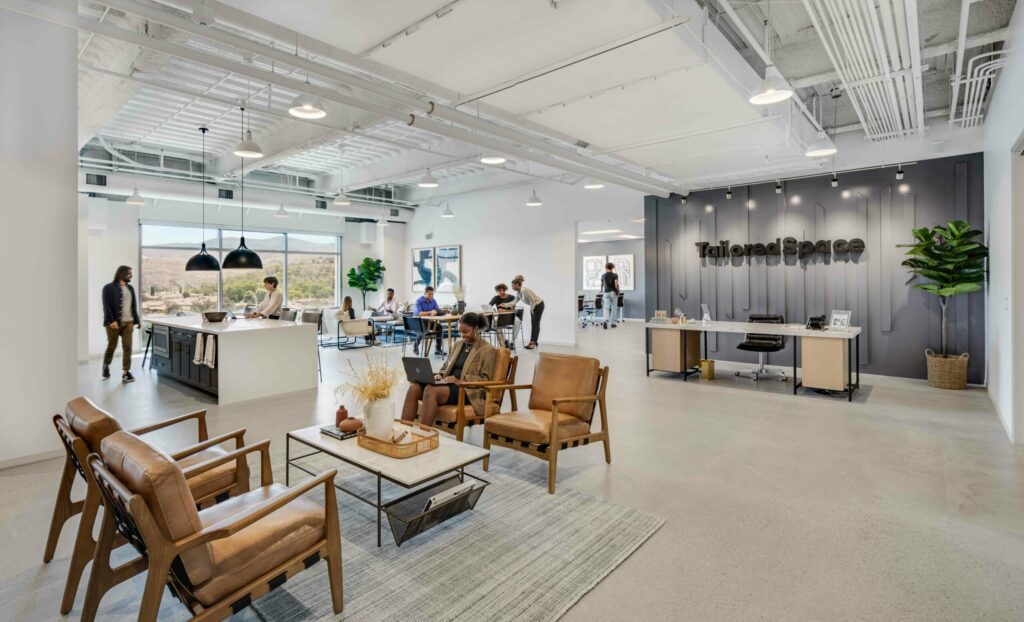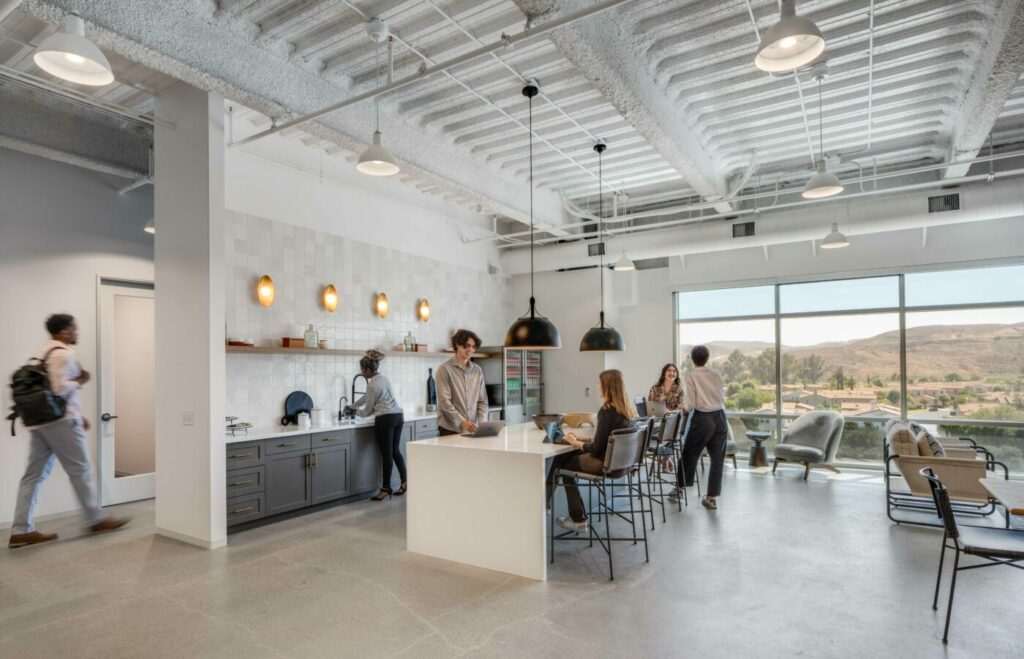The concept of coworking has revolutionized the way we do business. Coworking spaces offer a shared working environment for individuals, small to medium-sized companies and even large corporations.
They are an inexpensive way to get access to office space and jam-packed with amenities. Coworking workspaces were designed for entrepreneurs, startups and innovators to help them unleash their potential while keeping costs low.
Shared workspaces have helped fuel the growth of world-renowned organizations such as Indiegogo, Spotify, Uber, etc. But it’s not all rainbows and sunshine since it does have its downsides such as giving up control as far as workspace neighbors and branding goes.
Some of the most successful businesses in the world started from home in dingy garages to keep costs low while maximizing margins. While working from home does have its perks, it doesn’t do much in the way of raising morale, building relationships and promoting work-life balance.
What is coworking?
Coworking refers to a workspace arrangement that supports multiple workers working for different organizations operating under the same roof.
Coworking spaces allow entrepreneurs, startups, and corporations access to flexible shared office space where they can enjoy cost savings and reap the convenience of using shared infrastructure, e.g., utilities, receptionists, equipment, beverage services, internet connectivity, gymnasiums and even offer parcel acceptance services.
The History of Coworking
In 1999, Bernie Dekoven was the first person to use the word Coworking to refer to the collaborative work environment provided by computers and emerging technologies of the time. It wasn’t until six years later that shared or co-working spaces as we know them today came into being.
In 2005, Brad Neuberg first used the phrase to describe the workspaces where remote workers and “digital nomads” could come together and work in a casual workspace. Fast-forward to today, and there are thousands of coworking spaces spread all over the world.
Related: https://tailoredspace.com/mission/
How to explain coworking
While the concept has been around for nearly two decades, most people are still not familiar with it. The idea behind coworking is to provide a proper office space to those whose business models aren’t optimal for renting out an entire floor of office space. It also provides affordable office space for freelancers and digital nomads who would otherwise work from home, a place where many struggle with productivity or isolation. The results is a place where many people work on different projects for different businesses out of one shared location.
Why do people use coworking spaces? Top 10 Advantages of Coworking
Their main reason why more and more entrepreneurs, startups, freelancers and even large corporations are shifting away from the old traditional office workspace in favor of coworking is that it’s effective. Here are the top ten reasons to consider switching to a coworking space.
1. Access to Resources

Coworking has provided access to resources that many, for instance, freelancers, would not have otherwise had such as meeting rooms and amenities.
2. Diverse work environment

Coworking spaces allow people to engage and interact with individuals with diverse backgrounds, working for different environments. This helps minimize internal politics or direct competition and will enable people to be themselves and build on their individual identity.
3. Access to outside skill sets

Coworking office spaces promote a culture of collaboration and provide numerous opportunities for doing just that. Remember, the diverse backgrounds of individuals in a coworking space translates to a wide range of expertise and experience.
4. Sustainability:

Traditional construction techniques and renting out an entire floor for one business to operate out of is not the most environmentally friendly way of setting up shop. Coworking spaces are often flexible in changing layouts to suit the evolving needs of businesses.
5. Flexibility in Scheduling

Most coworking spaces have a 24/7 open policy. This allows individuals to work long hours to complete a project or a milestone, have different hours to save on commute times, or even hit the gym in the middle of a workday to refresh.
6. Increased productivity

Most remote workers value their autonomy, but they’ve come to realize that they need a bit of structure to enhance their work ethic. Coworking spaces provide an environment that offers this much-needed structure and instills discipline.
7. Networking

Making connections is a big part of the human experience and most coworking spaces help members build these connections. Not only are they beneficial socially, but these connections could provide valuable insights and knowledge for your operation.
8. Cost-efficiency

As a freelancer or startup, the overhead costs of running your business must be kept to a bare minimum. Coworking spaces are a great way of doing so because they provide everything an entrepreneur needs to hit the ground running and more.
9. Work-life balance

It’s essential to have and maintain a work-life balance. That’s why a majority of coworking spaces offer amenities such as a gym, spa, yoga studio, being pet-friendly etc. all of which promote a better work-life balance because of the relaxed atmosphere.
10. Payment flexibility

As an entrepreneur, startup, or freelancer, paying a hefty deposit or getting locked into a long-term lease may seriously affect cash flow. Fortunately, communal spaces provide flexible payment options and allow members to pay daily or monthly.
So, why does coworking make sense for the modern workforce?
Traditional workspaces are now a thing of the past; say hello to the future of workplaces i.e., coworking spaces. They offer numerous benefits in a variety of areas of any organization making them the ideal solution for improving productivity, performance and reduces costs.
Well, thanks to rapidly evolving technological infrastructure, people no longer have to travel to a central hub or repository to collaborate. Technology has made it possible for people to get work done and effectively communicate anytime and anywhere despite being in different locations.
Coworking space helps eliminate the monotony and stress of commuting to and from the same office space in the same location at the same exact time each day.
What’s more, the modern workforce is environmentally conscious and are looking to minimize carbon footprints produced by public and private transportation.
Related: The Ins and Outs of Flexible Office Spaces
TailoredSpace is helping businesses of all sizes from solopreneurs and startups to large corporations save money and provide flexibility in their working arrangements. Learn more today.
Psychological Benefits of Coworking Spaces
Remote working is a growing trend with nearly two-thirds of the workforce desiring flexibility in their working arrangements. While we are on the tail end of a global pandemic that served as a catalyst for this change, technology was already putting the shift in motion.
Coworking space businesses have already been addressing this shift by providing the option to work in collaborative environments without maintaining the overhead of a traditional office. Human beings are social in nature and while many would prefer to spend some time working from home, the need for face-to-face interaction still helps shape the productivity of many teams.
Who uses Coworking Spaces?
As the world becomes interconnected and global marketplaces open up, the traditional workplace’s 9-to-5 workdays are slowly being pushed out thanks to coworking spaces.
These communal workspaces allow colleagues and clients to collaborate across the world, which has the added benefit of making workdays a little more elastic.
That’s why more and more companies, regardless of size, are making the shift to coworking spaces to improve efficiency and meet the demands of the modern workforce. But who uses coworking spaces?
Coworking for Small Businesses / SMEs
As an entrepreneur or startup, you spend a great deal of time working on completing projects or milestones which means staring at the laptop all day or getting buried in tons of work.
While working on the kitchen counter or the local café has its perks, it’s vital the business has a physical address for large meetings or when meeting with potential prospects/investors.
Coworking for Freelancers
From cutting overhead costs to making a killer first impression to networking to zero office politics, coworking spaces provide plenty of benefits to freelancers.
The prevailing perception around coworking is that of a disruptive model, a majority of entrepreneurs and freelancers reported that it boosted their motivation as well as helped them thrive.
Coworking for Corporations
While most people believe that coworking spaces are built mainly for freelancers, startups, and digital nomads, they’re not.
More and more corporations such as Facebook, Microsoft, IBM have been slowly making the shift to use coworking spaces to capitalize on the flexibility and productivity that comes with working in a relaxed environment.
The Types of Coworking
While coworking may be the latest buzz word in the workplace environment, there’s nothing new about it since it’s been around for nearly two decades.
It’s only recently that coworking has been identified as a possible solution for dealing with problems such as distractions, loneliness, isolation, etc. that are common among freelancers working from home.
But before signing on the dotted line, here are some of the types of coworking spaces available:
1. Single business coworking space:
This communal space typically operates only one main business and lease out any other desks they no longer need to create a coworking environment.
2. Coworking workspaces:
These refer to established businesses whose primary offering is their office spaces which they lease out to SMEs and freelancers.
Check out all of our unique TailoredSpace coworking spaces Today!

3. Coworking Incubators:
These are co-working spaces that provide business development services in an environment that allows entrepreneurs to connect with other like-minded individuals.
Related: How to Get Out of a Commercial Lease, Pain-free
Coworking Vs. Other Remote Work Alternatives
While coworking spaces are often considered to be the gold standard for remote workers, they’re by no means the only option available to them. There are plenty of other remote work alternatives that are rather inexpensive compared to coworking spaces, but they don’t provide the same comfort.
The first alternative option for remote workers is the local coffee shop. We recommend using it only when a change of scenery and some background noise will help improve productivity.
The second best option is the local library. It’s a beautiful and quiet environment to get work done for a few hours provided silence is maintained so no phone calls.
The third and final option, a virtual office, is best suited for entrepreneurs and freelancers who are always on the move. They provide pretty much the same features of coworking space with only one exception; they exist only virtually.
Things to consider when choosing a coworking space
Finding a home for your business is probably as tricky as finding your own home. There are plenty of aspects and amenities that you should consider but here are the most important ones:
1. Location:
As an entrepreneur, when finding a home for your business, you must choose the right spot because it can severely impact your profits. Always go for a killer impression for service-based companies or choose a coworking space close to home for remote work.

2. Budget:
Your budget will pretty much determine the type of coworking space you go for. A good rule of thumb is to keep expenses low because, ultimately, to grow your business, you need to minimize costs and maximize revenues.

3. Work Environment:

Your working environment and the number of distractions in it play a significant role in determining how well you perform. When choosing a coworking space, it’s essential to take the time to visit the area to make sure that it’s suitable for you.
4. Community

This should be a priority if you’re looking to grow your business. Going to your space, seeing members of the community hustle, and thrive will inspire you to keep the candle burning and wake up to work with enthusiasm.
5. Short-Term or Long-Term

The last thing you want to consider is how long you’ll be leasing your coworking space. Short-term leases can be great when you only have a couple of projects to take care of; however, if you’ve got a steady stream of customers, then you may want to consider a long-term engagement.
Related: 15 Tips to Increase Office Productivity
The Future of Coworking:

While traditional offices are still the predominant work environment model, more and more people and businesses are shifting towards the disruptive model, coworking spaces.
Over the past few years, the number of coworking spaces has skyrocketed, and as of 2019, there were 19000 communal spaces on the planet with over 3 million coworkers during the same year. Coworking spaces are not a dying trend, they’re here to stay and they provide everything you need and more.
Notable Companies Who Started in Coworking Spaces
When leasing an office long-term or writing out hefty deposit checks are not an option, then coworking spaces could be the perfect inexpensive solution. They’re a great way of building morale, networking, and collaborating. The following companies capitalized on that to get to where they are now.
Indiegogo: known for its crowdfunding campaigns, the less than a decade old internet company has helped entrepreneurs the world over to raise funds for their business ventures or products.
Uber: the next company needs no introduction. It helps connect passengers with drivers in over 500 cities in the world, and it all started in a coworking space.
The economics of coworking (real estate)

From startups to entrepreneurs to SMEs to large corporations, everyone seems to have taken a liking to coworking spaces. While the trend does affect the way a company does business, what is even more curious is how it affects commercial office real estate.
As more and more people and companies jump on the coworking bandwagon, so are real estate investors who are committing an average of between 15-30% of their portfolio to coworking spaces.
Many building owners are also joining coworking companies in forming partnerships to increase occupancy rates across their buildings.
Coworking Space Business Amenities
Coworking spaces offer a plethora of options to suit the needs of almost any individual, business or conglomerate. Is coworking the right option for you?
TailoredSpace offers individuals desks, offices and private suites from our Carlsbad, Riverside, and West Covina Campuses. Contact us today to see any of the TailoredSpace offices.